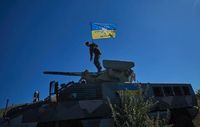Germany approved a significant military aid package for Ukraine on Friday, March 21, 2025, amounting to three billion euros (approximately $3.25 billion). This decision comes as a crucial response to the ongoing conflict with Russia, signifying Germany's role in fortifying Ukraine's defense capabilities.
The parliament's budget committee gave the green light for the funds specifically designated for defense equipment, which includes munitions, drones, armored vehicles, and advanced air-defense systems. President Volodymyr Zelensky expressed his gratitude towards Germany through a post on social media platform X, stating that the aid would provide "exactly what Ukraine needs most — what saves Ukrainian lives." He emphasized that this assistance paves the way for contracts with the German defense industry, marking a significant step toward establishing long-term security guarantees for Ukraine.
Zelensky welcomed the decision, noting, "I welcome Germany’s strong decision to support Ukraine with an additional €3 billion in funding for defense needs for 2025, and nearly €8.25 billion for the following years (2026–2029)." This funding is part of a larger commitment, with four billion euros already planned in Germany’s budget for military aid to Ukraine in 2025 and a future commitment of an additional 8.3 billion euros earmarked for 2026 to 2029.
Included in this latest aid package are German-made Iris-T air-defense systems, which are set to be delivered over the next two years. The additional funds come alongside reports that Germany has contributed approximately 28 billion euros to Ukraine since the onset of Russia's full-scale invasion over three years ago, making it Ukraine's second-largest military aid supplier after the United States.
The political landscape in Germany reflects a collaborative effort to enhance military support for Ukraine. Greens MP Britta Hasselmann, whose party has consistently advocated for Ukraine's assistance, expressed relief that the funds were finally being released, deeming it "a strong signal to Ukraine, a signal that is absolutely necessary for peace and security in Europe." This acknowledgment underscores the urgency of military support amid fluctuating tensions in the region.
As both Russia and Ukraine continue to trade accusations over recent military actions, the timing of this aid release couldn't be more critical. Just days before the scheduled talks with US officials in Saudi Arabia aimed at discussing a possible truce, both nations have reported significant overnight attacks. Despite claims of mutual agreement on pausing strikes on energy targets, the reality on the ground suggests continued hostilities.
Chancellor Olaf Scholz, who has vowed that Germany will not abandon Ukraine, reiterated commitment, stating, "Ukraine can rely on us and we will never leave it on its own." He added a cautionary note regarding future peace talks, stating, "It will also need a strong army in times of peace, and it must not be put in danger by any peace agreement." This dual emphasis on military strength and diplomatic engagements encapsulates Germany's strategic approach toward supporting Ukraine.
Among those affected by the aid initiatives are the operators of the German defense industry, which will likely see a surge in contracts as a result of the latest funding. The focus on modern military equipment highlights the role of technological advancements in current military operations and reflects a broader shift in Germany's defense policy since the inception of the conflict.
With a new spending package under the leadership of Friedrich Merz, Germany’s chancellor-in-waiting, the coalition is expected to work toward solidifying Germany's armed forces and ensuring continued support for Ukraine. The dynamics of coalition politics, particularly in light of recent elections, suggest an increased prioritization of military readiness and strategic engagement in international affairs.
Thus, as military tensions mount in Ukraine, Germany's latest aid package serves as both a tangible support mechanism for Ukraine's defense and a pivotal point in the larger geopolitical chess game being played across Europe. In a region fraught with uncertainty, Ukraine’s reliance on aid from allies like Germany signifies the interconnectedness of international political commitments, security concerns, and humanitarian imperatives.
Looking ahead, the future of this military relationship, highlighted by substantial financial support and strategic agreements, will likely shape not only the battlefield but the broader narrative of European security in the years to come.
As the international community watches closely, the commitment from Germany and other allies remains a critical factor in Ukraine's ongoing struggle for sovereignty and peace.





